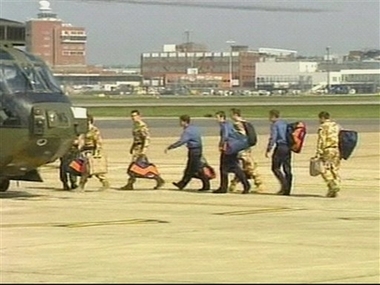LONDON - Fifteen British sailors and marines held captive for nearly two weeks in Iran arrived home Thursday, a day after the announcement of their release defused a growing confrontation between the two countries.
The British Airways plane landed at the VIP suite near Heathrow's Terminal Four, and passengers were being led off the back of the plane. Armed police patrolled the tarmac as two military helicopters idled on the airport's North runway.
President Mahmoud Ahmadinejad's announcement in Tehran Wednesday was a breakthrough in a crisis that had escalated over nearly two weeks, raising oil prices and fears of military conflict in the volatile region. The move to release the sailors suggested that Iran's hard-line leadership decided it had shown its strength but did not want to push the standoff too far.
In London, British Prime Minister Tony Blair welcomed their return but called for continued international pressure on Tehran following the deaths of four servicemen in an attack in Iraq earlier in the day.
"Now it is far too early to say that the particular terrorist act that killed our forces was an acted committed by terrorists that were backed by any elements of the Iranian regime, so I make no allegation in respect of that particular incident," Blair said.
Iran did not get the main thing it sought - a public apology for entering Iranian waters. Britain, which said its crew was in Iraqi waters when seized, insists it never offered a quid pro quo, either, instead relying on quiet diplomacy.
Syria, Iran's close ally, said it played a role in winning the release. "Syria exercised a sort of quiet diplomacy to solve this problem and encourage dialogue between the two parties," Syrian Foreign Minister Walid al-Moallem said in Damascus.
The announcement of the release came hours after US House Speaker Nancy Pelosi met with President Bashar Assad in Damascus, trying to show that a US dialogue with Syria - rejected by the Bush administration - could bring benefits for the Middle East. The British sailors were not part of their talks, and it was not clear if the release was timed to coincide with her visit.
Several British newspapers credited Blair's foreign policy adviser Nigel Sheinwald and Iranian chief negotiator Ali Larijani with laying the groundwork for an agreement during telephone contacts that began Tuesday night. Larijani had gone on British TV on Monday and signaled that Tehran was looking for a diplomatic solution.
British officials were told to pay close attention to Ahmadinejad's news conference but were unsure the release would come until they heard his words, The Independent newspaper said.
Ahmadinejad timed the announcement so as to make a dramatic splash, springing it halfway through a two-hour news conference.
The president first gave a medal of honor to the commander of the Iranian coast guards who captured the Britons, and admonished London for sending a mother, Leading Seaman Faye Turney, on such a dangerous mission in the Persian Gulf.
He said the British government was "not brave enough" to admit the crew had been in Iranian waters when it was captured.
Ahmadinejad then declared that even though Iran had the right to put the Britons on trial, he had "pardoned" them to mark the March 30 birthday of the Prophet Muhammad and the coming Easter holiday.
"This pardon is a gift to the British people," he said.
After the news conference, Iranian television showed a beaming Ahmadinejad on the steps of the presidential palace shaking hands with the Britons - some towering over him. The men were decked out in business suits and Turney wore an Islamic head scarf.
"Your people have been really kind to us, and we appreciate it very much," one of the British men told Ahmadinejad in English. Another male service member said: "We are grateful for your forgiveness."
Ahmadinejad responded in Farsi, "You are welcome."
Three members of the crew were later interviewed on Iranian state-run television, apologizing for the alleged incursion into Iran's waters and again thanking Ahmadinejad for their release.
"I can understand why you're insulted by the intrusion into the waters," said Lt. Felix Carman, shown seated on a couch.
"Thank you for letting us go and we apologize for our actions, but many thanks for having it in your hearts to let us go free," Turney said.
The breakthrough caught the British government by surprise. On Tuesday, Foreign Secretary Margaret Beckett cautioned reporters not to expect a quick end to the standoff.
The US cautiously welcomed Iran's announcement, though Vice President Dick Cheney said "it was unfortunate that they were ever taken in the first place."
During the standoff, Iran broadcast footage of Turney and some other crew members "confessing" they had entered Iranian waters. An infuriated Britain froze most bilateral contacts, prompting Tehran to roll back on a pledge to free Turney.
Wednesday's announcement led some analysts to conclude that Iran's supreme leader, Ayatollah Ali Khamenei, decided the crisis had gone on long enough at a time when Tehran faces mounting pressure over its nuclear program. A day after the British were seized, the UN Security Council imposed new sanctions on Iran for refusing to halt uranium enrichment.
During Ahmadinejad's news conference, the hardline president said Britain had sent a letter to the Iranian Foreign Ministry pledging that entering Iranian waters "will not happen again." Tehran had demanded an apology for the alleged entry into its waters.
Britain's Foreign Office would not give details about the letter but said its position was clear that the detained crew had been in Iraqi waters.

No comments:
Post a Comment